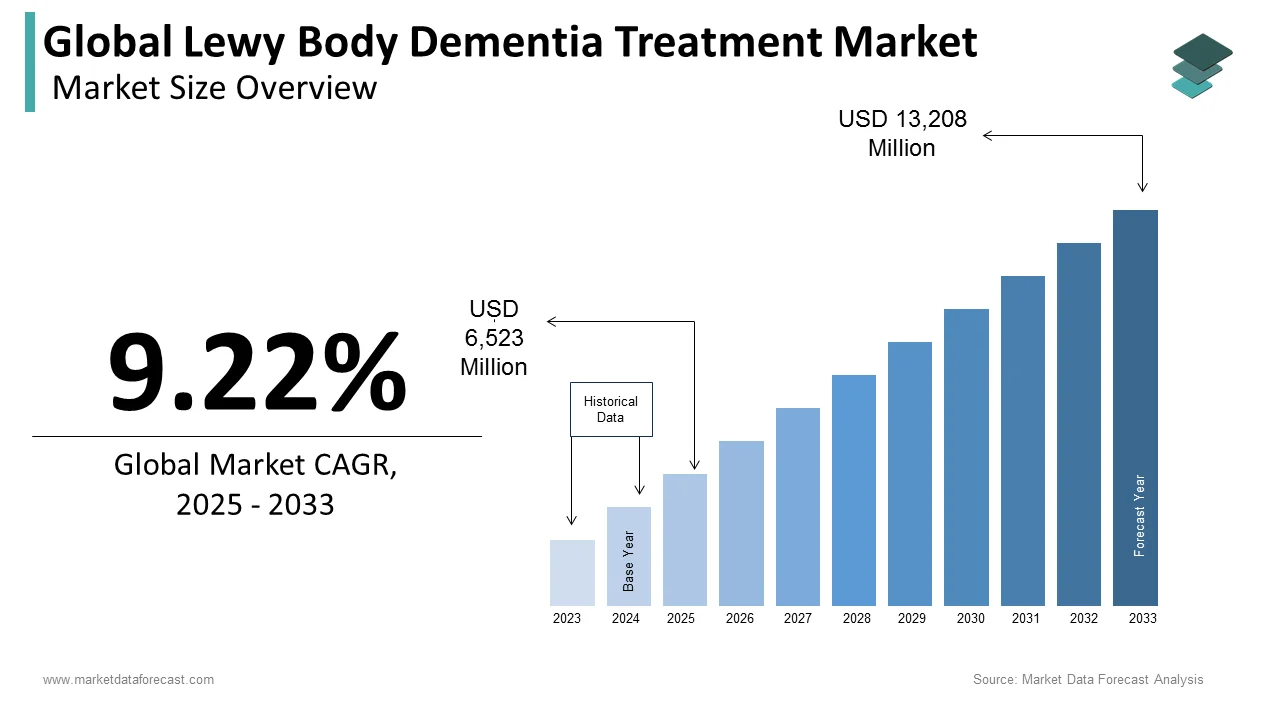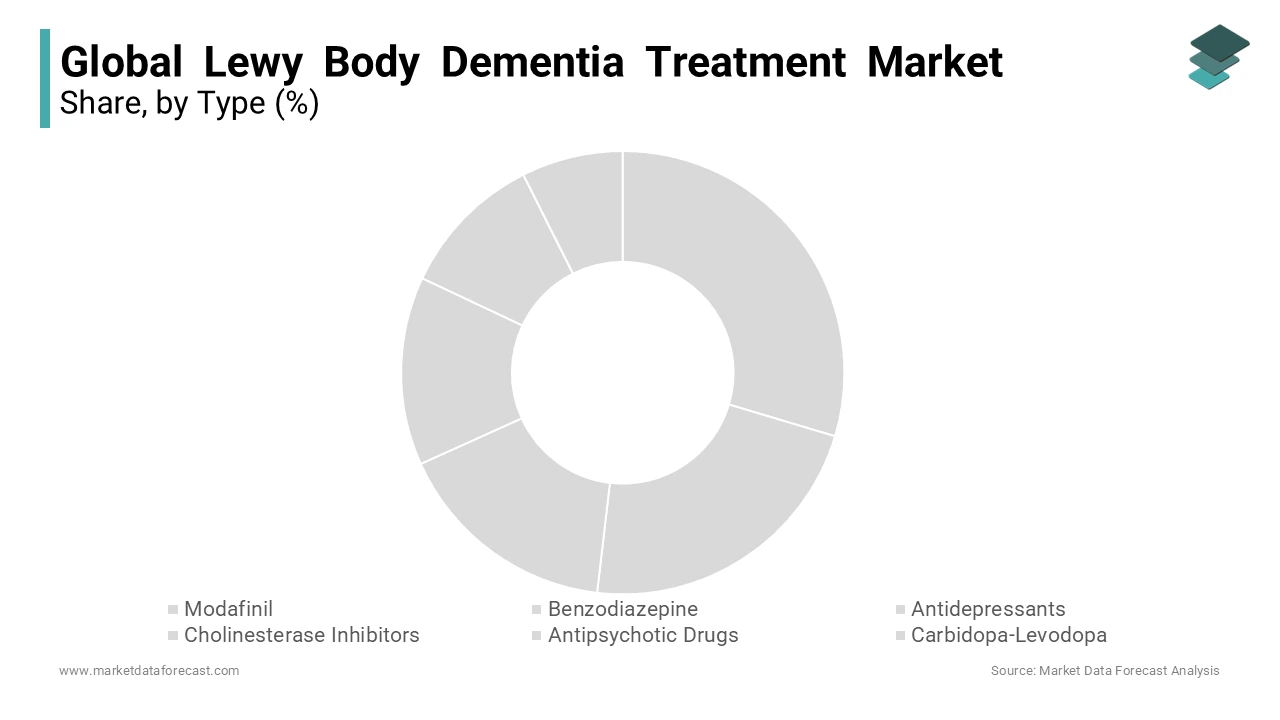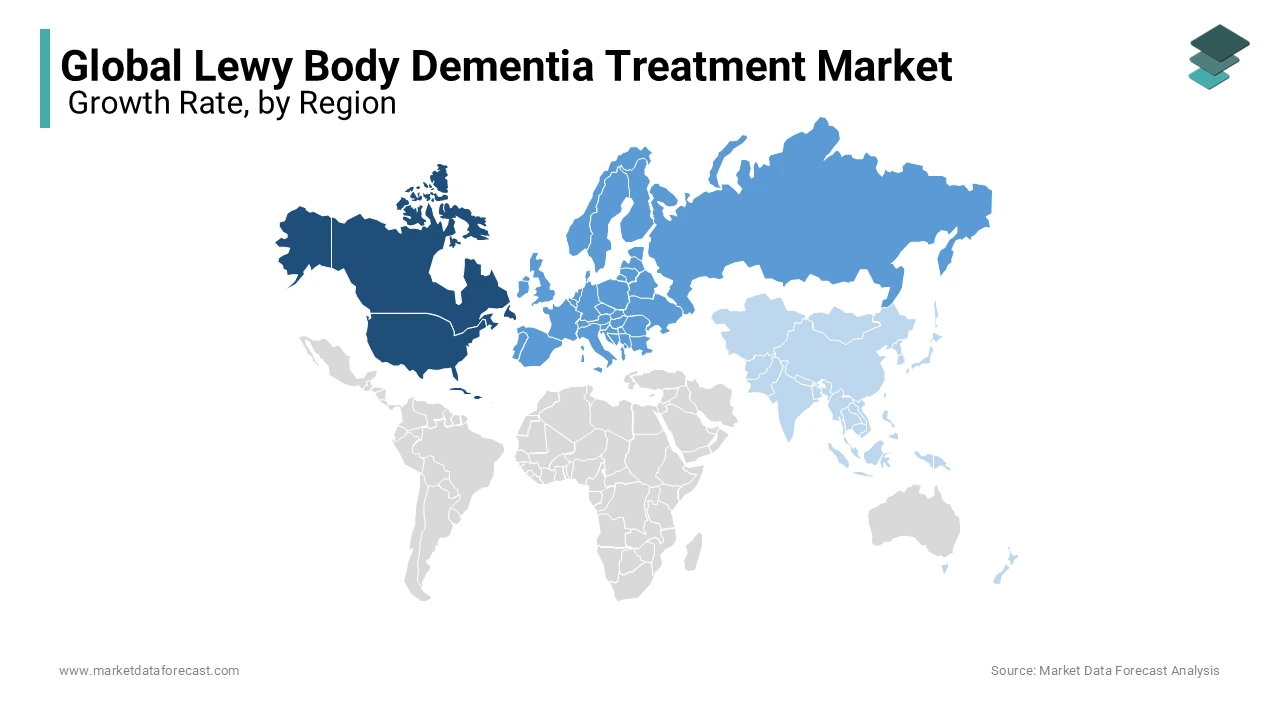Global Lewy Body Dementia Treatment Market Size, Share, Trends & Growth Forecast Report By Type (Modafinil, Benzodiazepine, Antidepressants, Cholinesterase Inhibitors, Antipsychotic Drugs and Carbidopa-Levodopa), By Indication (Parkinson’s Disease and Alzheimer’s Disease), Distribution Channel (Hospital Pharmacies, Retail Pharmacies and Online Pharmacies) and Region (North America, Europe, Asia-Pacific, Latin America, Middle East and Africa), Industry Analysis From 2025 To 2033.
Global Lewy Body Dementia Treatment Market Size
The size of the global lewy body dementia treatment market was valued at USD 5,972 million in 2024. The global market is expected to register a CAGR of 9.22% from 2025 to 2033 and be worth USD 13,208 million by 2033 from USD 6,523 million in 2025.

The global lewy body dementia treatment market has experienced notable growth in the recent past and is expected to showcase promising growth during the forecast period. The incidence of lewy body dementia is gradually growing in multiple countries. For instance, an estimated more than 1.4 million people are suffering from LBD in the United States alone. The prevalence of LBD is rapidly growing in countries in which the aging population is increasing significantly. The global lewy body dementia treatment market currently has intense competition and several pharmaceutical companies and biotech firms are striving to develop effective therapies. Among all the market participants, companies such as Biogen, Eisai, and Roche are at the forefront and have been investing significantly in R&D to develop innovative treatments for LBD. Strategic partnerships and collaborations with research institutions and other biotech firms and focusing on personalized medicine to develop treatments based on patient profiles to improve outcomes are some other major strategies that the market participants are employing to improve their position in the global market. During the forecast period, as the awareness of lewy body dementia among people increases, the demand for LBD treatment is likely to accelerate and fuel the global market growth.
MARKET DRIVERS
YoY Rise in the Prevalence of Lewy body dementia (LBD)
Lewy body dementia (LBD) is considered one of the most common types of progressive dementia. At present, a considerable number of aged people worldwide are suffering from LBD. In the coming years, the number of patients affected with LBD is likely to increase further, and these patients require specialized care to get cured and become LBD-free. As per the statistics of the Lewy Body Dementia Association, an estimated 1.4 million people in the U.S. are currently suffering from Lewy body dementia (LBD), and LBD is the second most common form of dementia after Alzheimer's in the U.S. The World Health Organization (WHO) estimates that the prevalence of LBD is increasing at the same rate, the global population is increasing in the coming years, and the number of people suffering from LBD is expected to double by the end of 2040. As these sources indicate, the growth in the population suffering from LBD is directly proportional to the LBD treatment market growth.
Growing Aging Population Worldwide
An increase in life expectancy is likely to result in the number of aged people who are at risk of LBD. The aging population is growing rapidly worldwide. As per the projections of the United Nations, the number of people aged 60 and above is anticipated to reach 2.1 billion by 2050 worldwide. According to the data from the World Health Organization, the average life expectancy grew from 66.8 years in 2000 to 73.3 years in 2019. These statistics highlight the possibility of the growing incidence of age-related diseases such as LBD among the aging population and are anticipated to result in an increasing demand for LBD treatment options.
In addition, advancements in diagnostic techniques, growing awareness about neurodegenerative diseases, increasing number of improvements in the healthcare infrastructure in several countries, growing availability of funding to conduct R&D around neurodegenerative disorders and rising emphasis on the development of novel therapeutics are aiding the growth of the global LBD treatment market. The growing number of initiatives and increasing support from the governments in favor of LBD treatments, rising demand for personalized medicine, increase in the number of clinical trials for dementia treatments and growing use of biomarkers for early detection are promoting the growth of the global lewy body dementia treatment market growth. Furthermore, factors such as the increasing number of collaborations between research institutions and pharmaceutical companies, technological advancements in drug delivery systems, and the growing adoption of telemedicine and remote patient monitoring are contributing to the expansion of the global market.
MARKET RESTRAINTS
A limited Understanding of the Disease Pathology
In addition, the high cost of treatment and medications, lack of effective treatment options, low awareness about Lewy body dementia, and difficulties in the early diagnosis of the disease are further hampering the global market growth. Insufficient funding for research and development, complex regulatory approval processes, and high prevalence of misdiagnosis. The limited availability of specialized healthcare professionals in some countries and the slow adoption of new treatment protocols also have a negative impact on the growth of the global LBD treatment market.
REPORT COVERAGE
|
REPORT METRIC |
DETAILS |
|
Market Size Available |
2024 to 2033 |
|
Base Year |
2024 |
|
Forecast Period |
2025 to 2033 |
|
CAGR |
9.22% |
|
Segments Covered |
By Connectivity, End User, and Region |
|
Various Analyses Covered |
Global, Regional & Country Level Analysis; Segment-Level Analysis, DROC, PESTLE Analysis, Porter’s Five Forces Analysis, Competitive Landscape, Analyst Overview of Investment Opportunities |
|
Regions Covered |
North America, Europe, APAC, Latin America, Middle East & Africa |
|
Market Leaders Profiled |
Grundfos Pumps Corporation, Xylem, Sulzer Ltd, Spring, Precision Digital Corporation, Kirloskar Brothers Limited, Dwyer Instruments, Inc., and Others. |
SEGMENTAL ANALYSIS
By Type Insights
The cholinesterase inhibitors segment dominated the market and accounted for 26.6% of the global market share in 2023 and is predicted to be the fastest growing segment in the global market during the forecast period. Cholinesterase inhibitors are primarily used to manage cognitive symptoms in LBD patients. The growing usage of cholinesterase inhibitors to manage cognitive symptoms in LBD and rising awareness among medical professionals of the efficacy of cholinesterase inhibitors in improving cognition and reducing neuropsychiatric symptoms are propelling the growth of the cholinesterase inhibitors segment in the worldwide market. As per the data of the Alzheimer’s Association, an estimated 70% of LBD patients are treated with cholinesterase inhibitors to manage cognitive symptoms.

The antidepressants segment was the second biggest segment in the global market by type in 2023 and held 20.2% of the worldwide market share. Depression affects up to approximately 60% of LBD patients. The growing awareness of psychiatric symptoms in LBD is one of the key factors propelling the growth of the antidepressants segment in the worldwide market.
By Indication Insights
The Parkinson’s disease segment accounted for 62.2% of the worldwide market share in 2023 and is expected to register a healthy CAGR during the forecast period. The shared pathological mechanisms and overlapping symptoms of Parkinson’s disease with Lewy body dementia, the increasing geriatric population, advancements in treatment options, and growing awareness of Parkinson’s disease among people are majorly supporting the expansion of the segment in the global market. As per the statistics of Parkinson's Foundation, more than 10 million people worldwide are currently suffering from Parkinson’s disease and the prevalence of the disease is likely to be doubled by 2040.
By Distribution Channel Insights
The hospital segment led the market and had a share of 54.7% of the worldwide market in 2023 and the domination of the hospital segment in the global market is likely to continue during the forecast period. The presence of specialized healthcare professionals primarily drives the growth of the hospital segment in the global market, the availability of a wide range of medications and the requirement for hospital-based diagnostic and treatment services in hospitals. For instance, more than 60% of LBD patients are diagnosed and receive initial treatment in hospital settings.
REGIONAL ANALYSIS
North America emerged as the most dominating regional segment for Lewy body dementia treatment worldwide in 2023 and took occupancy of 40.1% of the global market. Estimates indicate that the domination of North America in the global market will continue during the forecast period owing to factors such as the availability of advanced healthcare infrastructure, increasing prevalence of dementia-related disorders, and high adoption rates of novel treatments in North America. The high healthcare expenditure and increasing number of research initiatives to focus on developing disease-modifying therapies and improving diagnostic accuracy in North America are further fuelling the growth rate of the North American market.

Europe is anticipated to account for a notable share of the worldwide market during the forecast period. Y-o-Y rise in the aging population and rising awareness about dementia disorders are propelling the lewy body dementia treatment market in Europe. As per the data of Alzheimer Europe, more than 1 million people in Europe are suffering from LBD. Initiatives from the governments of European countries to improve healthcare infrastructure and funding to conduct R&D around dementia in Europe are further promoting regional market expansion. According to the European Commission, the Horizon Europe initiative by the European Union allocated significant funding for dementia research.
The Asia-Pacific region is anticipated to showcase rapid growth in the global market during the forecast period and stand as the fastest-growing regional segment. The growing investments by the governments of Asia-Pacific countries in the healthcare industry, Y-o-Y rise in the geriatric population and improving access to healthcare services across the region are driving the lewy body dementia treatment market. In this region, Japan and South Korea have been facing considerable challenges in managing dementia-related disorders. China and India have been aiming to improve dementia care infrastructure and promote early diagnosis and treatment through healthcare reforms and initiatives.
KEY MARKET PLAYERS
Abbott, Amneal Pharmaceuticals LLC, B Braun SE, BioArctic AB, Boehringer Ingelheim International GmbH, Bausch Health Companies Inc., Eli Lilly and Company, F. Hoffmann-La Roche Ltd., GlaxoSmithKline, Integra LifeSciences, Jazz Pharmaceuticals, Johnson & Johnson Services Inc., Medtronic, Merck & Co Inc., MicroPort Scientific Corporation, Mallinckrodt Pharmaceuticals, Mylan NV, Novartis AG, NuVasive Inc., Orthofix US LLC, Perrigo Company plc., Pfizer Inc., Sanofi AG, Sumitomo Dainippon Pharma Co. Ltd., Stryker Corporation, Takeda Pharmaceutical Company Ltd., Teva Pharmaceuticals, and Zimmer Biomet are currently playing the leading role in the global lewy body dementia treatment market.
MARKET SEGMENTATION
This research report on the global lewy body dementia treatment market has been segmented and sub-segmented based on the following categories.
By Type
- Modafinil
- Benzodiazepine
- Antidepressants
- Cholinesterase Inhibitors
- Antipsychotic Drugs
- Carbidopa-Levodopa
By Indication
- Parkinson’s Disease
- Alzheimer’s Disease
By Distribution Channel
- Hospital Pharmacies
- Retail Pharmacies
- Online Pharmacies
By Region
- North America
- Europe
- Asia-Pacific
- Latin America
- Middle East and Africa
Frequently Asked Questions
At what CAGR, the global lewy body dementia market is anticipated to grow?
The global lewy body dementia treatment market is anticipated to witness a CAGR of 9.22% from 2025 to 2033.
Which region is estimated to show fastest growth in the global lewy body dementia market?
The Asia-Pacific region is predicted to be the fastest-growing regional segment in the worldwide market.
What are the companies playing a key role in the global lewy body dementia market?
A few of the notable players in the global lewy body dementia market include Abbott, Amneal Pharmaceuticals LLC, B Braun SE, BioArctic AB, Boehringer Ingelheim International GmbH, Bausch Health Companies Inc., Eli Lilly and Company, F. Hoffmann-La Roche Ltd., GlaxoSmithKline, Integra LifeSciences, Jazz Pharmaceuticals, Johnson & Johnson Services Inc., Medtronic, Merck & Co Inc., MicroPort Scientific Corporation, Mallinckrodt Pharmaceuticals, Mylan NV, Novartis AG, NuVasive Inc., Orthofix US LLC, Perrigo Company plc., Pfizer Inc., Sanofi AG, Sumitomo Dainippon Pharma Co. Ltd., Stryker Corporation, Takeda Pharmaceutical Company Ltd., Teva Pharmaceuticals, and Zimmer Biomet
Related Reports
Access the study in MULTIPLE FORMATS
Purchase options starting from $ 2500
Didn’t find what you’re looking for?
TALK TO OUR ANALYST TEAM
Need something within your budget?
NO WORRIES! WE GOT YOU COVERED!
Call us on: +1 888 702 9696 (U.S Toll Free)
Write to us: [email protected]
